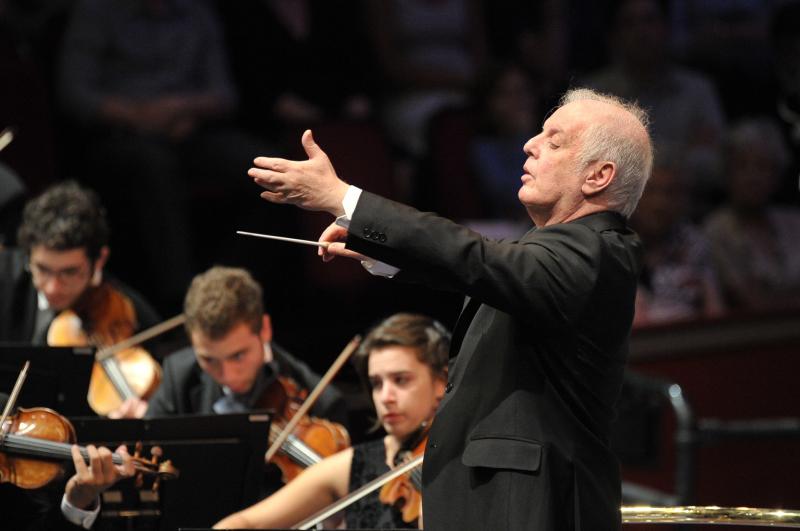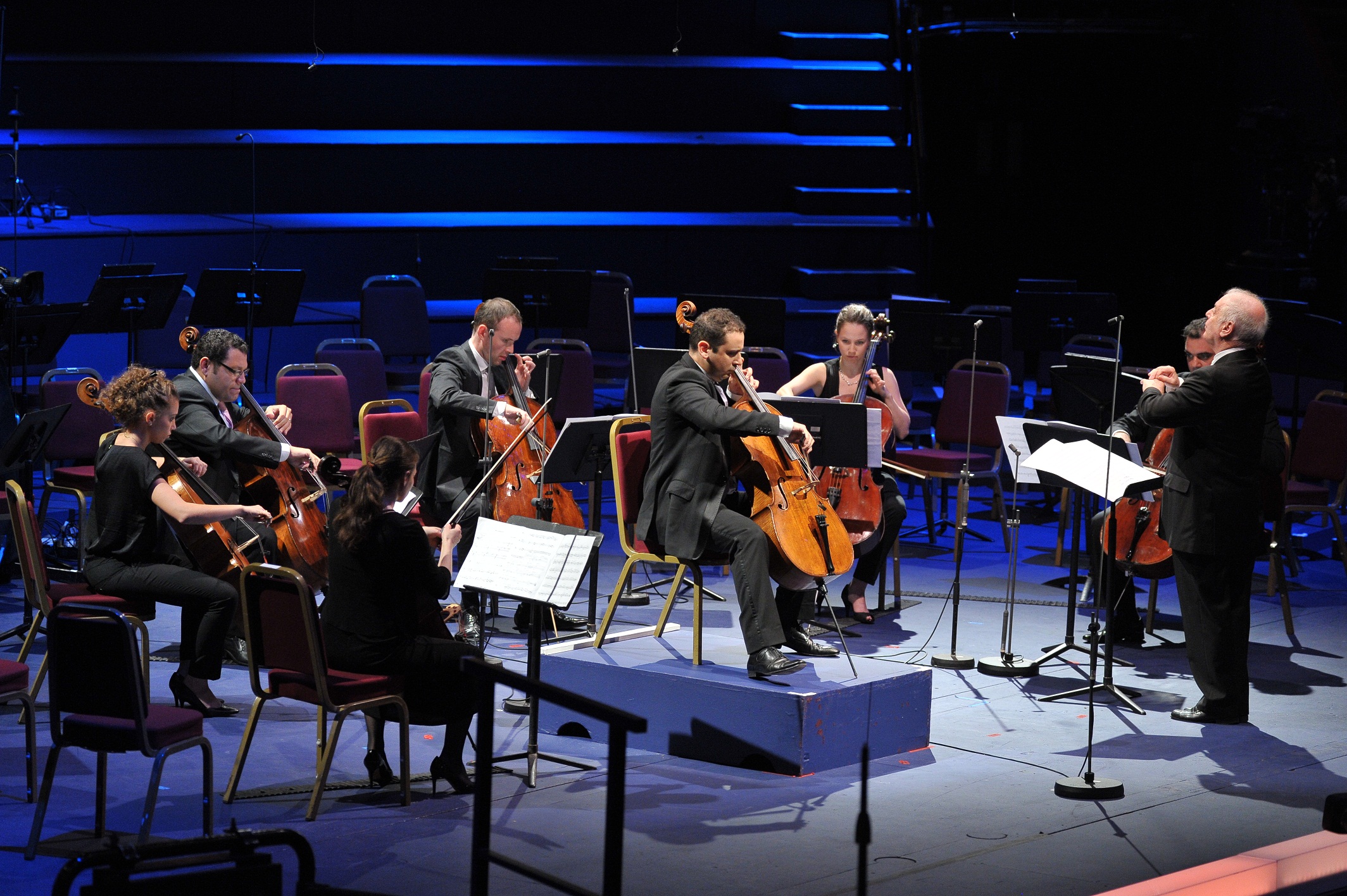BBC Proms: West-Eastern Divan Orchestra, Barenboim (Concert 3) | reviews, news & interviews
BBC Proms: West-Eastern Divan Orchestra, Barenboim (Concert 3)
BBC Proms: West-Eastern Divan Orchestra, Barenboim (Concert 3)
Heavyweight Beethoven proved leaden-footed at times

We’ve had more than our fair share of Beethoven symphonies in London recently. But with the Proms’s monolithic Daniel Barenboim cycle now midway through, memories of Riccardo Chailly and John Eliot Gardiner are being steadily blotted out. Gone are the frisky tempos, the lightness of touch, and in their place we’re being reintroduced to Beethoven the heavyweight.
The first movement of Beethoven’s Symphony No 6 may be marked “Allegro non troppo”, but the composer’s in-built caveat against high speeds surely doesn’t imply quite the ponderous plod that Barenboim took his West-Eastern Divan Orchestra on last night. Muting the volume to match the sedate tempo (what is the point in performing Beethoven with a large contemporary orchestra in the Royal Albert Hall and then dampening them down continually to such extremes of softness?), he offered us a Pastoral Symphony without the dirt, a countryside vision free from weeds, eyesores and any discernable life.
It was joyous and comedic, but felt like an arrival we hadn’t quite earned in the earlier orchestral travails
Beethoven’s brook (perhaps the topical victim of eutrophication) didn’t babble so much as trickle sluggishly, despite a gorgeous moment of watery mischief from the bassoon. There was a storm, but one whose sudden lurch of volume left it struggling to transition back into the pastel landscape and cardboard peasantry Barenboim had painted all around it. The wind fluted and fluttered with charm and colour, but couldn’t escape from the cage of dull strings that surrounded them.
We fared rather better with the Fifth, and as soon as its rather brisker opening and incisive tone were established Barenboim’s earlier restraint made more sense. Reading the two symphonies as the pair that they are he crafted a single emotional arc – releasing everything in the Fifth that he had withheld in the Sixth, making public and explicit all that had previously been celebrated privately. It’s a legitimate and bold approach, but one that I couldn’t help sacrificed the Sixth as collateral damage in order to rise that much more spectacularly to glory in the Fifth.
 There was clarity undoubtedly, and some textural moment of supreme invention (the bassoon once again rising out above the strings in avuncular commentary), but while Barenboim proved himself a skilled manipulator of balance, his bigger gestures lacked proportion. After an Andante con moto of only moderate warmth (despite the eight double basses rising high above the orchestra, who came into their own in the fugal section of the Allegro) we moved into a closing Allegro of almost pantomime brightness. It was joyous and comedic, but felt like an arrival we hadn’t quite earned in the earlier orchestral travails.
There was clarity undoubtedly, and some textural moment of supreme invention (the bassoon once again rising out above the strings in avuncular commentary), but while Barenboim proved himself a skilled manipulator of balance, his bigger gestures lacked proportion. After an Andante con moto of only moderate warmth (despite the eight double basses rising high above the orchestra, who came into their own in the fugal section of the Allegro) we moved into a closing Allegro of almost pantomime brightness. It was joyous and comedic, but felt like an arrival we hadn’t quite earned in the earlier orchestral travails.
During Barenboim’s Beethoven there’s a fair amount of time off for brow-mopping, when the diligent but oddly characterless members of WEDO are left to their own devices, but in his Boulez there’s rarely a moment left unchaperoned. Meticulous and clear where all before had been leaden and Romantic, Boulez’s two chamber miniatures Mémoriale and Messagesquisse offered an acid aside between symphonies.
Although muddled by a programme error that left half the audience traipsing in and out (and in and out again) during the works, they lost little of their concise beauty in the scuffle. Built around a solo flute (Guy Eshed) and solo cello (Hassan Moataz El Molla) respectively (pictured above), the first offered an angsty elegy of muted colour, flutter-tongued flute set against gauzy strings and horns. But where Eshed gave us emotive detail and contemplation, Molla gave us virtuosic display backed by the eerie shadow-sounds of cellos played col legno. In the Royal Albert Hall the latter translated rather better, demanding attention rather more directly from a restive half-time audience.
You couldn’t dine on Barenboim’s Beethoven every day; it would be altogether too rich for anyone’s digestion. But there’s much to be said for his weighty, rather old-fashioned readings, that give the details of the composer’s more time to emerge. The meatier the symphony the more successful the approach it seems, leaving One, Six and possibly Eight in difficulties, but finding a more natural fit in Three and Five. Anyone who passes up the chance to hear his Ninth would be foolish indeed.
Share this article
Add comment
The future of Arts Journalism
You can stop theartsdesk.com closing!
We urgently need financing to survive. Our fundraising drive has thus far raised £49,000 but we need to reach £100,000 or we will be forced to close. Please contribute here: https://gofund.me/c3f6033d
And if you can forward this information to anyone who might assist, we’d be grateful.

Subscribe to theartsdesk.com
Thank you for continuing to read our work on theartsdesk.com. For unlimited access to every article in its entirety, including our archive of more than 15,000 pieces, we're asking for £5 per month or £40 per year. We feel it's a very good deal, and hope you do too.
To take a subscription now simply click here.
And if you're looking for that extra gift for a friend or family member, why not treat them to a theartsdesk.com gift subscription?
more Classical music
 Robin Holloway: Music's Odyssey review - lessons in composition
Broad and idiosyncratic survey of classical music is insightful but slightly indigestible
Robin Holloway: Music's Odyssey review - lessons in composition
Broad and idiosyncratic survey of classical music is insightful but slightly indigestible
 Classical CDs: Wolf-pelts, clowns and social realism
British ballet scores, 19th century cello works and contemporary piano etudes
Classical CDs: Wolf-pelts, clowns and social realism
British ballet scores, 19th century cello works and contemporary piano etudes
 Bizet in 150th anniversary year: rich and rare French offerings from Palazzetto Bru Zane
Specialists in French romantic music unveil a treasure trove both live and on disc
Bizet in 150th anniversary year: rich and rare French offerings from Palazzetto Bru Zane
Specialists in French romantic music unveil a treasure trove both live and on disc
 Scottish Chamber Orchestra, Ibragimova, Queen’s Hall, Edinburgh review - rarities, novelties and drumrolls
A pity the SCO didn't pick a better showcase for a shining guest artist
Scottish Chamber Orchestra, Ibragimova, Queen’s Hall, Edinburgh review - rarities, novelties and drumrolls
A pity the SCO didn't pick a better showcase for a shining guest artist
 Kilsby, Parkes, Sinfonia of London, Wilson, Barbican review - string things zing and sing in expert hands
British masterpieces for strings plus other-worldly tenor and horn - and a muscular rarity
Kilsby, Parkes, Sinfonia of London, Wilson, Barbican review - string things zing and sing in expert hands
British masterpieces for strings plus other-worldly tenor and horn - and a muscular rarity
 From Historical to Hip-Hop, Classically Black Music Festival, Kings Place review - a cluster of impressive stars for the future
From quasi-Mozartian elegance to the gritty humour of a kitchen inspection
From Historical to Hip-Hop, Classically Black Music Festival, Kings Place review - a cluster of impressive stars for the future
From quasi-Mozartian elegance to the gritty humour of a kitchen inspection
 Shibe, LSO, Adès, Barbican review - gaudy and glorious new music alongside serene Sibelius
Adès’s passion makes persuasive case for the music he loves, both new and old
Shibe, LSO, Adès, Barbican review - gaudy and glorious new music alongside serene Sibelius
Adès’s passion makes persuasive case for the music he loves, both new and old
 Anja Mittermüller, Richard Fu, Wigmore Hall review - a glorious hall debut
The Austrian mezzo shines - at the age of 22
Anja Mittermüller, Richard Fu, Wigmore Hall review - a glorious hall debut
The Austrian mezzo shines - at the age of 22
 First Person: clarinettist Oliver Pashley on the new horizons of The Hermes Experiment's latest album
Compositions by members of this unusual quartet feature for the first time
First Person: clarinettist Oliver Pashley on the new horizons of The Hermes Experiment's latest album
Compositions by members of this unusual quartet feature for the first time
 Gesualdo Passione, Les Arts Florissants, Amala Dior Company, Barbican review - inspired collaboration excavates the music's humanity
At times it was like watching an anarchic religious procession
Gesualdo Passione, Les Arts Florissants, Amala Dior Company, Barbican review - inspired collaboration excavates the music's humanity
At times it was like watching an anarchic religious procession
 Classical CDs: Camels, concrete and cabaret
An influential American composer's 90th birthday box, plus British piano concertos and a father-and-son duo
Classical CDs: Camels, concrete and cabaret
An influential American composer's 90th birthday box, plus British piano concertos and a father-and-son duo
 Cockerham, Manchester Camerata, Sheen, Martin Harris Centre, Manchester review - re-enacting the dawn of modernism
Two UK premieres added to three miniatures from a seminal event of January 1914
Cockerham, Manchester Camerata, Sheen, Martin Harris Centre, Manchester review - re-enacting the dawn of modernism
Two UK premieres added to three miniatures from a seminal event of January 1914

Comments
This review does not
I missed the Pastoral